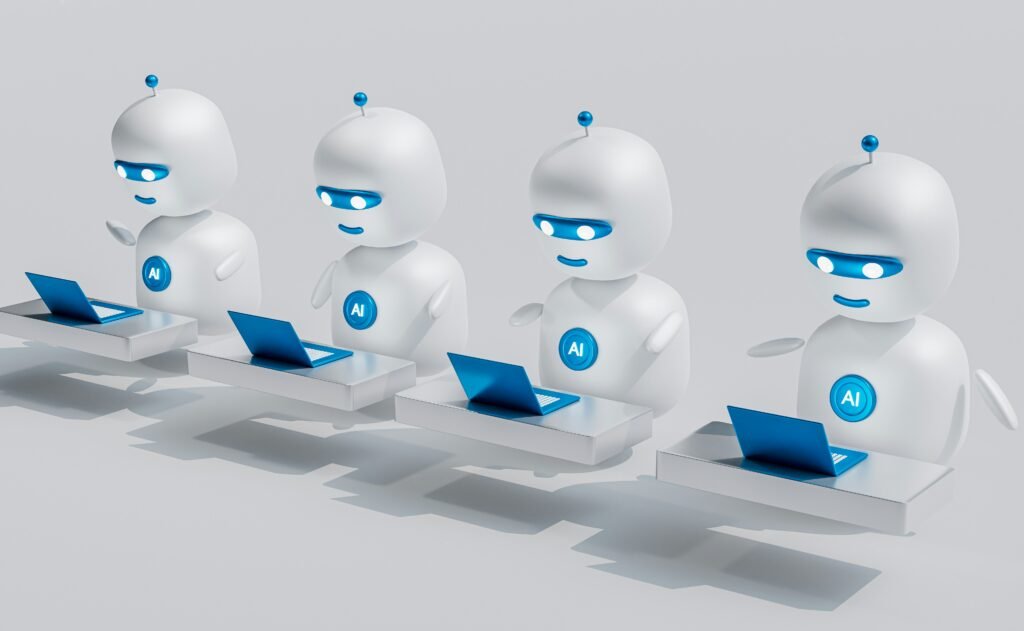Introduction to Chatbots

Chatbots have emerged as a vital component in the realm of digital communication, serving a range of purposes across various industries. At their core, chatbots are artificial intelligence (AI) applications designed to simulate human-like conversations, allowing them to interact with users in a seamless manner. Their ability to understand and respond to natural language makes them a powerful tool for enhancing user experiences and automating responses to inquiries.
The evolution of chatbots can be traced back to the 1960s, with early programs like ELIZA and PARRY paving the way for more sophisticated AI systems. As technology has advanced, so has the complexity and functionality of chatbots. Modern chatbots leverage algorithms and machine learning to provide relevant responses based on user input, thus transforming them into versatile digital assistants capable of handling various tasks such as customer service support, personal scheduling, and even e-commerce transactions.
One of the key enhancements in chatbot capabilities has been the integration of artificial intelligence. This advancement allows chatbots to learn from previous interactions, making them increasingly adept at understanding user intent and context. Natural Language Processing (NLP) techniques enable them to comprehend the nuances of human language, which is crucial for delivering accurate and meaningful responses. This AI-driven evolution has not only improved the efficiency of chatbots but has also expanded their applicability, making them indispensable across sectors ranging from healthcare to finance.
As we delve deeper into the capabilities of specific chatbots like ChatGPT and Gemini, it is essential to appreciate the foundational role that chatbots play in modern communication. Understanding their purpose, evolution, and reliance on artificial intelligence will provide a framework for a more informed comparison between these two advanced conversational agents.
What is ChatGPT?
ChatGPT is an advanced conversational agent developed by OpenAI, built upon the GPT (Generative Pre-trained Transformer) architecture. This chatbot is notable for its capacity to understand and generate human-like text based on the nuanced patterns learned from a vast corpus of data. The underlying architecture of ChatGPT enables it to process language in a sophisticated manner, making it capable of engaging in coherent dialogues, answering questions, and providing assistance across a myriad of topics.
One of the primary strengths of ChatGPT lies in its ability to generate contextually relevant and meaningful responses. By leveraging the principles of unsupervised learning, it has been trained on diverse internet text, allowing it to handle a wide range of queries. This capability makes ChatGPT particularly effective in areas such as customer support, tutoring, content creation, and language translation. Its versatility enables users to implement it in various fields, from education to e-commerce, enhancing interactions with technology.
As a ChatGPT user, one can appreciate its intuitive interface and responsiveness. The chatbot excels in language comprehension, making it adept at understanding user intentions and generating appropriate replies. Real-life applications of ChatGPT include automating customer service interactions, facilitating interactive learning environments, and enhancing human-computer collaboration in creative tasks. Moreover, its deployment across different platforms has showcased its ability to operate seamlessly in chat applications, websites, and even integrated software solutions. This flexibility has contributed to the growing interest among businesses and developers keen on harnessing the capabilities of this powerful chatbot.
What is Gemini?
Gemini is an advanced chatbot developed by Google DeepMind, designed to revolutionize user interactions with artificial intelligence. Launched as a competitor to existing generative AI models, Gemini utilizes a unique training methodology that sets it apart from traditional chatbots. By leveraging large-scale datasets and advanced machine learning techniques, Gemini enhances its understanding of language, making it capable of contextual understanding and nuanced responses.
One of the standout features of Gemini is its ability to apply contextual information throughout a conversation. Unlike earlier chatbots that often relied on keyword matching, Gemini comprehends the meaning behind users’ inputs, thereby fostering more natural and engaging interactions. This ability to process and retain context has made it particularly effective in various applications, including customer service, content creation, and personalized recommendations.
Moreover, Gemini’s architecture integrates long-term memory capacities, allowing it to remember details from previous interactions, which improves ongoing conversations. Users find that this capability enables more productive discussions and personalized experiences, as the chatbot adapts its responses based on prior exchanges. This leads to significant improvements in customer satisfaction and engagement rates.
In practical scenarios, Gemini has proven invaluable across several domains. In e-commerce, for instance, it excels in customer support, where it can efficiently handle inquiries, troubleshoot issues, and even suggest products tailored to individual preferences. In healthcare, Gemini assists in patient engagement by answering queries, providing supportive information, and scheduling appointments effectively. Its flexibility and adaptability make it a versatile tool across various sectors.
Overall, Gemini represents a significant advancement in the field of chatbots and AI interactions, demonstrating vast potential to reshape the landscape of automated communication and service delivery.
Comparative Analysis of ChatGPT and Gemini
The evolution of artificial intelligence has heralded the advent of sophisticated chatbots such as ChatGPT and Gemini. Both systems leverage advanced technologies to facilitate interactions; however, they reveal distinct characteristics when subjected to comparative analysis.
ChatGPT, developed by OpenAI, utilizes a transformer-based architecture to process and generate human-like text through extensive training on a diverse dataset. Its impressive language understanding allows it to engage in meaningful dialogues across numerous topics. In contrast, Gemini, crafted by Google DeepMind, employs its unique approach to natural language processing, aiming for contextual relevance and enhanced user engagement. This difference in foundational technology may impact response dynamics, making Gemini particularly effective in maintaining contextual continuity in conversations.
When examining ease of integration, ChatGPT offers a user-friendly API, which fosters seamless implementation across various platforms. This aspect is particularly advantageous for businesses seeking to incorporate AI into their existing systems swiftly. Gemini, while also providing integration options, may require more technical expertise, potentially posing challenges for users without a robust IT background. Thus, the accessibility of ChatGPT could be viewed as a strength in environments where rapid deployment is essential.
In terms of response accuracy, both chatbots exhibit commendable performance; however, their strengths vary depending on the context. ChatGPT often excels in casual conversation scenarios, demonstrating considerable adaptability, while Gemini shows a preference for technical discussions and tasks requiring in-depth knowledge. User experiences indicate that Gemini’s answers in specialized domains can be more reliable than those of ChatGPT, although both continue to improve over time.
Finally, versatility remains a defining trait in the assessment of these chatbots. ChatGPT’s broader conversational capabilities make it suitable for diverse applications, while Gemini’s focus on precision enables it to excel in more niche environments. Overall, the choice between ChatGPT and Gemini ultimately depends on specific user needs and the context of application.
Performance Metrics and User Feedback
When evaluating the capabilities of advanced chatbots like ChatGPT and Gemini, performance metrics and user feedback serve as crucial indicators of their effectiveness and overall user experience. These metrics include response time, relevance of answers, user satisfaction ratings, and error rates, all contributing to a comprehensive assessment of each chatbot’s performance.
Response time, often viewed through the lens of user expectations, measures how quickly a chatbot can generate and present answers. Users generally prefer chatbots that can provide prompt responses, as this enhances engagement. Initial analyses suggest that ChatGPT averages a response time of 0.5 to 2 seconds, while Gemini displays a similar range but tends to occasionally lag under heavy user traffic. While both automation systems utilize extensive datasets to formulate responses, the consistency of response time can vary depending on the inherent complexities of the queries posed.
Relevance of answers is another significant measure. This involves examining how effectively the chatbot understands and addresses user inquiries. User feedback has indicated a tendency for ChatGPT to deliver increasingly contextually relevant responses, owing to its refined natural language processing capabilities. Gemini, while adept at delivering accurate information, may require further optimization in comprehending nuanced questions. User satisfaction ratings often reflect these findings, with surveys revealing that approximately 75% of ChatGPT users reported high satisfaction levels compared to a slightly lower 65% for Gemini.
Error rates, representing the frequency of misunderstood or inaccurate responses, provide additional insight into a chatbot’s reliability. In recent evaluations, ChatGPT has maintained a lower error rate of around 10%, while Gemini is reported to have an error rate measuring approximately 15%. Such statistics underscore the notion that, while both platforms exhibit capabilities, ChatGPT currently presents stronger empirical performance metrics supported by user feedback.
Technological Innovations and Features
The landscape of chatbots has evolved significantly, with developments in technology enhancing their capabilities and user experience. Two prominent players in this arena, ChatGPT and Gemini, showcase remarkable advancements in natural language processing (NLP) and machine learning methodologies. By employing sophisticated algorithms and data-driven approaches, both chatbots exhibit a level of intelligence that facilitates natural conversations with users, but they do so through different technological innovations.
ChatGPT, developed by OpenAI, has implemented advanced deep learning techniques, particularly focusing on transformer architecture that optimizes its conversational abilities. This enables ChatGPT to understand context-rich prompts and generate coherent and contextually appropriate responses. Its abilities are further reinforced through multi-turn dialogue handling, allowing for smoother interactions reminiscent of human conversation. This feature promotes a more engaging and dynamic exchange by maintaining context across multiple exchanges.
In contrast, Gemini, developed by Google DeepMind, has introduced innovative personalization techniques that enhance user interactions. With its state-of-the-art learning mechanisms, Gemini adapts to user preferences over time, learning to provide more relevant and tailored responses. This allows Gemini to offer a unique user experience that evolves according to individual preferences, thus making conversations feel more intuitive and human-like.
Both ChatGPT and Gemini leverage extensive training on diverse datasets, ensuring that their responses are not only accurate but also linguistically nuanced. While ChatGPT excels in providing coherent and context-rich dialogue, Gemini’s strength lies in its ability to personalize interactions based on accumulated user data. These distinctive features showcase the impressive technological advancements each chatbot brings, underlining their respective strengths in enhancing conversational AI systems.
Use Cases and Industries Served
ChatGPT and Gemini have made significant inroads across various industries, showcasing their versatility and practical applications. One of the most notable areas where these chatbots are utilized is customer service. Organizations leverage these AI-driven solutions to streamline customer interactions, providing timely responses to inquiries, resolving issues, and enhancing overall customer satisfaction. For example, e-commerce websites often integrate ChatGPT to assist customers in navigating product offerings or tracking their orders, thus reducing the burden on human representatives and improving operational efficiency.
In the education sector, both chatbots are transforming traditional learning environments. ChatGPT, for instance, serves as a virtual tutor, offering personalized assistance to students. It can answer questions, help with homework assignments, and provide resources for further learning. Gemini, on the other hand, focuses on enhancing classroom experiences through engaging activities such as quizzes and discussions, encouraging student participation and fostering a collaborative learning atmosphere.
Healthcare is yet another industry benefiting from these advanced chatbots. Facilities are implementing ChatGPT to facilitate appointment scheduling, manage patient inquiries, and even offer preliminary diagnostic support based on symptoms described by patients. Gemini, with its capability for nuanced understanding, can support medical professionals by providing relevant research articles or assisting in patient case reviews, thereby contributing to better-informed medical decisions.
Moreover, both chatbots are making strides in sectors like finance, where they assist customers in managing accounts, understanding financial products, and providing investment advice. In the travel industry, chatbots enable seamless booking experiences, offering travel suggestions, itinerary planning, and real-time updates on flight statuses.
Overall, the application of ChatGPT and Gemini spans a multitude of industries, demonstrating their potential to solve real-life problems and improve operational workflows across diverse sectors. Their ability to adapt to different contexts makes them invaluable assets to organizations aiming to enhance customer experience and operational efficiency.
Future Prospects and Developments
The evolution of chatbots has garnered considerable interest, particularly with the advancements represented by ChatGPT and Gemini. As technology continues to evolve, the future of these chatbots promises exciting developments that could significantly enhance user experiences. One of the most pressing areas for improvement lies in natural language understanding. Both ChatGPT and Gemini are expected to refine their conversational abilities, enabling them to comprehend context and nuances more effectively. This could lead to more engaging and meaningful interactions, crucial for applications in customer service and personal assistance.
Furthermore, as machine learning techniques advance, we may witness improved adaptability in these chatbots. Machine learning allows for continuous learning from user interactions, which in turn could facilitate a more customized and personalized experience. Users might find that their preferred chatbot can adapt better to individual communication styles and preferences over time, making conversations more fluid and relevant. Additionally, the incorporation of multimodal capabilities—that is, the ability to process and respond using not just text but also images, voice, and video—could expand the utility of chatbots significantly.
The integration of ethical considerations and bias mitigation strategies is another anticipated trend. Developers and researchers are increasingly focused on creating fair and transparent AI systems. Consequently, future iterations of ChatGPT and Gemini are likely to prioritize ethical frameworks to ensure user trust and mitigate biases, promoting responsible AI usage. This could involve creating more diverse training datasets and algorithms designed to recognize and counteract potential biases.
In summary, the future of chatbots, particularly for platforms like ChatGPT and Gemini, appears to be oriented towards enhanced understanding, personalization, and ethical practice. As these technologies advance, users can expect increasingly sophisticated and reliable interactions that hold the potential to transform the user experience in countless ways.
Conclusion: Which Chatbot Reigns Supreme?
In evaluating the capabilities of ChatGPT and Gemini, one must consider various factors that contribute to their overall effectiveness as chatbots. These two advanced AI systems have been designed to cater to different user needs and contexts, showcasing distinct strengths and weaknesses that may influence user preference. ChatGPT, known for its conversational fluency and rich context comprehension, excels in generating human-like text and engaging in extended dialogues. Its strength lies in the ability to provide personalized responses, making it suitable for tasks that prioritize a high level of interaction.
Conversely, Gemini aims to offer a more structured and precise approach to information retrieval and processing. With features optimized for integration into various applications, this chatbot is particularly well-suited for users requiring accurate data handling and quick responses in specific scenarios. Its architecture allows for a more formal interaction, which can be advantageous for professional and technical inquiries. Thus, while both chatbots demonstrate advanced capabilities, their effectiveness may vary depending on the user’s specific requirements.
When choosing between ChatGPT and Gemini, users should carefully assess their priorities. Those in need of a chatbot for casual conversations or creative writing tasks might lean towards ChatGPT, benefiting from its natural language generation. On the other hand, users looking for a chatbot that emphasizes accuracy and rapid information processing may find Gemini to be more aligned with their needs. Ultimately, the decision rests on identifying the specific functionalities and interaction styles that best fit the user’s purposes. The evolving landscape of AI ensures that both chatbots will continue to develop, enhancing their features and broadening their applicability in the coming years.



